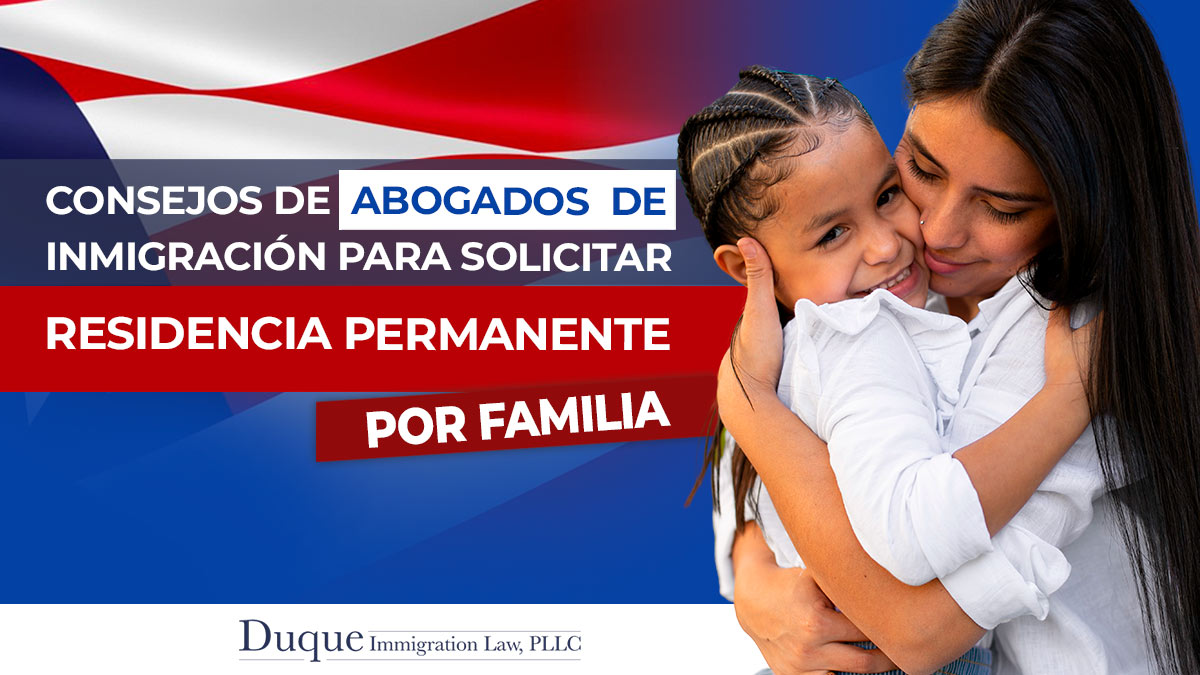Our immigration lawyers explain which family member(s) you can sponsor for a Green Card
Family-based permanent residency is one of the most common ways to obtain immigration status in the United States. This process allows U.S. citizens and permanent residents to sponsor certain family members for permanent residency. There are several categories of eligible relatives for permanent residency, including spouses, children, parents, and siblings.
One of the main advantages of applying for permanent residency through family is that it is a safe and stable way to obtain immigration status in the United States. Additionally, this process can also help reunite families who have been separated for a long time, which can be very important to many of my clients.
Furthermore, once permanent residency is obtained, beneficiaries can legally work in the United States, study, travel in and out of the country, and eventually apply for U.S. citizenship.
It is also important to note that family-based permanent residency can be a quicker and easier option than other methods of immigration. For example, obtaining a work or investment visa can be more complicated and requires more time and resources.
In summary, family-based permanent residency can be an excellent option for those who want to permanently settle in the United States and reunite with their loved ones. As immigration lawyers, we ensure to guide our clients through the entire process and help them achieve the best possible outcome.
Petitions for American residency/Green Card based on family
Who is eligible to obtain permanent residency in the U.S. through family, and what are the estimated wait times to receive the Green Card?
There are different categories of relatives who can sponsor a family member for permanent residency in the U.S. These categories include:
- Spouses of U.S. citizens and permanent residents.
- Unmarried children under 21 years of age of U.S. citizens and permanent residents.
- Married or unmarried children over 21 years of age of U.S. citizens and permanent residents.
- Parents of U.S. citizens.
Furthermore, siblings of U.S. citizens can also sponsor their siblings for permanent residency, but there is a limit on the number of visas available for this category, and the wait time can be longer.
Estimated wait times to receive the Green Card vary depending on the relationship category and the applicant’s country of origin. For example, people applying for permanent residency through a U.S. citizen spouse usually receive their Green Cards faster than those applying for residency through a U.S. citizen sibling. Additionally, wait times can be longer for people from certain countries due to visa demand and annual visa limits.
In general, wait times to receive the Green Card can range from several months to several years. As immigration lawyers in the United States, our job is to help our clients navigate this process and ensure they understand all the available options for them and the estimated wait times for their specific situation.
What is the duration of family-based permanent residency or Green Card?
The duration of family-based permanent residency or Green Card is ten years. After this period, Green Card holders must renew their immigration status to remain permanent residents.
Renewal of the Green Card must be done within the six months before the expiration of the Green Card. Green Card holders must file the I-90 form for Green Card renewal and pay the corresponding fee to request renewal. Additionally, in some cases, a Green Card renewal interview may be required.
It is important to note that permanent residency can be lost if the holder commits certain crimes or violates the terms of their immigration status. Therefore, it is important for Green Card holders to ensure compliance with all U.S. immigration laws and regulations.
Our team of immigration lawyers ensures that our clients understand all the requirements and responsibilities associated with their immigration status and guides them through the Green Card renewal process so they
The process to obtain a Green Card for a family member depends on the category of relationship and the immigration status of the sponsor. Generally, the process to obtain a Green Card for a family member involves the following steps:
Determine eligibility: The first thing I would do as an immigration lawyer is to determine if my client and their sponsor are eligible to apply for permanent residency in the U.S. through a family member. This includes checking if the sponsor is a U.S. citizen or permanent resident, and if the applicant qualifies in the appropriate relationship category.
File the petition: Once eligibility has been determined, the sponsor must file a visa petition for the family member with the U.S. Citizenship and Immigration Services (USCIS) using Form I-130, Petition for Alien Relative. In some cases, if the family member is already in the U.S., an adjustment of status petition may be filed simultaneously using Form I-485.
Wait for petition approval: After filing the petition, the USCIS will review the application and make a decision on whether to approve or deny the petition. If the petition is approved, the USCIS will forward the petition to the National Visa Center (NVC) to process the immigrant visa application.
Complete the consular process: If the family member is located outside the United States, the NVC will reach out to him or her and provide information on how to complete the consular process at the U.S. Embassy or Consulate in their home country. The process will include submitting forms and documentation, undergoing an interview, and obtaining an immigrant visa.
Enter the United States: Once the immigrant visa is approved, the family member may enter the United States as a permanent resident. If the family member is in the U.S. and has filed an adjustment of status petition simultaneously, an interview will be conducted and, if everything is in order, the family member will receive their Green Card by mail.
It is important to note that the process to obtain a Green Card for a family member can be complex and there may be certain requirements and deadlines that must be met. Therefore, I recommend seeking the advice of a team of professionals who can help navigate this process and keep you informed throughout.
Schedule your appointment today! Call us: 305 436 0155







 ¿Cómo puedo ayudarle? | How can I help you?
¿Cómo puedo ayudarle? | How can I help you?